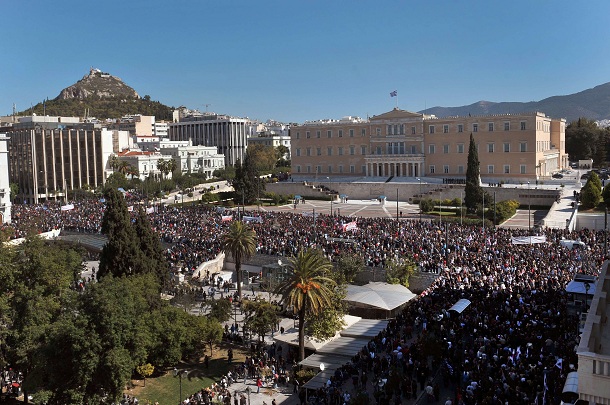Greek workers have started a general strike in protest against the new government’s ongoing implementation of eurozone austerity cuts.
Dozens of police riot vans have already been placed near the nation’s parliament, in preparation of any violence being directed at politicians.
The demonstration kicked off this morning, led by families pushing prams, protesting against the austerity cuts on Greek families.
Called by the country’s two biggest labour unions, the 24-hour strike will keep banks, schools and state services shut with hospitals operating on skeleton staff.
Rail services will be halted and ferries kept to ports, as scores of commercial aircraft remain grounded during a three-hour work stoppage by air traffic controllers.
In Athens, where judges, doctors and transport employees have stopped working since the start of the week, streets are already strewn with protest posters reading “S.O.S – save the country but above all its people”.
Organisers, expecting a strong turnout as the day progresses, have kept urban transportation running to allow protesters to attend scheduled marches.
The strike comes as Prime Minister Antonis Samaras and his coalition partners struggle to identify some 11.5bn euro (£9.14bn) in additional spending cuts.
Greeks see it as bitter medicine, which foreign creditors want in return for some 31bn euro (£24.66bn) in rescue loans.
Without the funds, cash-strapped Greece could go bankrupt within weeks, risking an exit from the 17-nation eurozone.
With Mr Samaras promising to honour the country’s commitments, fears of a Greek euro exit seem to have subsided.

Still, speculation rekindled this week, when International Monetary Fund managing director Christine Lagarde warned that the 11.5bn euro austerity package would not be enough to remedy the country’s growing budget gap.
By some accounts, Greece may need to close a 20bn euro (£16bn) gap to win vital bailouts – claims which the finance minister in Athens has vehemently denied – but further disillusions Greeks.
“We’re bleeding,” Maria Vassila, a teacher who gathered in central Athens to take part in planned protests, told Sky News.
“What’s the point, then, of taking even more measures if this plan of austerity isn’t working?”
With Greeks losing their jobs at a pace of 1,000 per day and wages down a third, recent polls showed 90% of Greeks billing the looming spending cuts “unfair” and a “burden on the poor”.
Meanwhile, about 70% – significantly lower than previous counts – said they wanted Greece to remain in the euro.
Growing anger has increased pressure on Mr Samaras and his fragile coalition.
Mr Samaras, 61, fought his way to power after two divisive elections in May and June, promising to renegotiate stringent terms of two multi-billion bailout agreements.
His socialist and leftist coalition partners have since then balked twice at biting cuts, expected to raise the retirement age from 65 to 67, scrap benefits for the handicapped and cut wages and pensions even further.
“This strike is just the start of a social explosion,” Stathis Anestis, a union leader with the General Confederation of Greek Workers, warned.
“We’re not going anywhere. We’re staying here, on the streets.”
Error, group does not exist! Check your syntax! (ID: 16)




